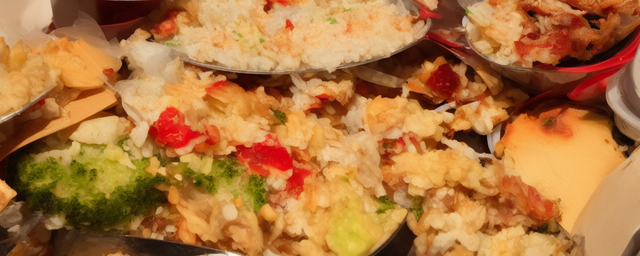
剩饭剩菜的危害
原|2024-04-25 20:20:58|浏览:62
Leftover rice and vegetables may seem harmless, but they can actually pose several health risks if not handled properly. Here are some of the dangers associated with leftover food:
1. Bacterial growth: When cooked food is left at room temperature for an extended period of time, bacteria can multiply rapidly. This can lead to food poisoning and other gastrointestinal issues if the contaminated food is consumed.
2. Toxin formation: Certain types of bacteria, such as Bacillus cereus, can produce toxins in food that can cause foodborne illnesses. These toxins are not destroyed by reheating the food, so consuming leftovers that have been improperly stored can still make you sick.
3. Mold growth: Leftover rice and vegetables are also prone to mold growth if not stored in airtight containers in the refrigerator. Mold can produce mycotoxins that are harmful to human health and can cause allergic reactions or respiratory problems.
4. Nutrient loss: The longer leftover food sits in the fridge, the more nutrients it loses. Reheating food multiple times can further degrade its nutritional value, making it less beneficial for your health.
5. Cross-contamination: If leftover rice and vegetables are stored alongside raw meat or other perishable items in the refrigerator, there is a risk of cross-contamination. This can lead to the transfer of harmful bacteria from one food item to another, increasing the likelihood of foodborne illnesses.
To minimize the risks associated with leftover food, it is important to follow proper food safety practices. This includes storing leftovers in airtight containers in the refrigerator within two hours of cooking, reheating them thoroughly before consumption, and discarding any leftovers that have been sitting out at room temperature for too long. By taking these precautions, you can enjoy your meals without putting your health at risk.
猜你喜欢
- 茶的分类及代表品种
- 六大茶类的代表名茶分别有
- 茶的类型和代表
- 六大茶叶的分类及产地
- 庙的分类及代表
- 藻的分类及其代表
- 茶的分类及代表茶品特点
- 茶的分类及代表茶
- 简述茶类的分类及其代表性名茶
- 六大茶类的分类及代表茶
- 动物分类及代表
- 糖的分类及代表
- 茶的分类及代表茶叶
- 茶的分类及代表图
- 茶的分类及代表作
- 茶器按质地的分类及代表茶器
- 茶的分类及代表名茶教学设计
- 简述茶的分类及代表性名茶
- 请写出乌龙茶的分类及代表茶
- 法国雅文邑白兰地系列
- 雅文邑白兰地介绍
- 1952年法国雅文邑白兰地
- 法国雅玛邑白兰地
- 纽波利顿獒
- 法国犬品种
- 南非獒犬的优缺点
- 波尔多獒犬寿命
- 波兰狩猎犬
- 波尔多犬和罗威纳犬对比
- 波尔多犬和杜高对比
- 世界十大凶犬
- 护卫犬排行榜前十名
- 大红袍怎么泡效果好
- 大红袍怎么泡不开
- 大红袍怎么泡茶
- 大红袍怎么泡出来没颜色
- 大红袍怎么泡不苦
- 大红袍怎么泡多久
- 大红袍怎么泡才正确的特点
- 大红袍怎么泡没有柴味儿
- 大红袍怎么泡放多少合适
- 花香大红袍怎么泡
- 大红袍怎么泡茶好
- 大红袍是怎么泡的
- 大红袍怎么泡水好喝
- 大红袍用玻璃杯怎么泡
- 大红袍怎么泡味道浓一些
- 十大排名果花茶
- 十大花茶组合排名
- 十大花茶品种大全
- 十大花茶功效
- 十大花茶销量排行榜
- 十大花茶有哪些
- 十大花茶品种
- 十大花茶推荐
- 十大花卉排行榜
- 十大花卉
- 十大花茶调理内分泌
- 九五至尊秦昊明月关山
- 红茶冲泡工艺
为你推荐






































































